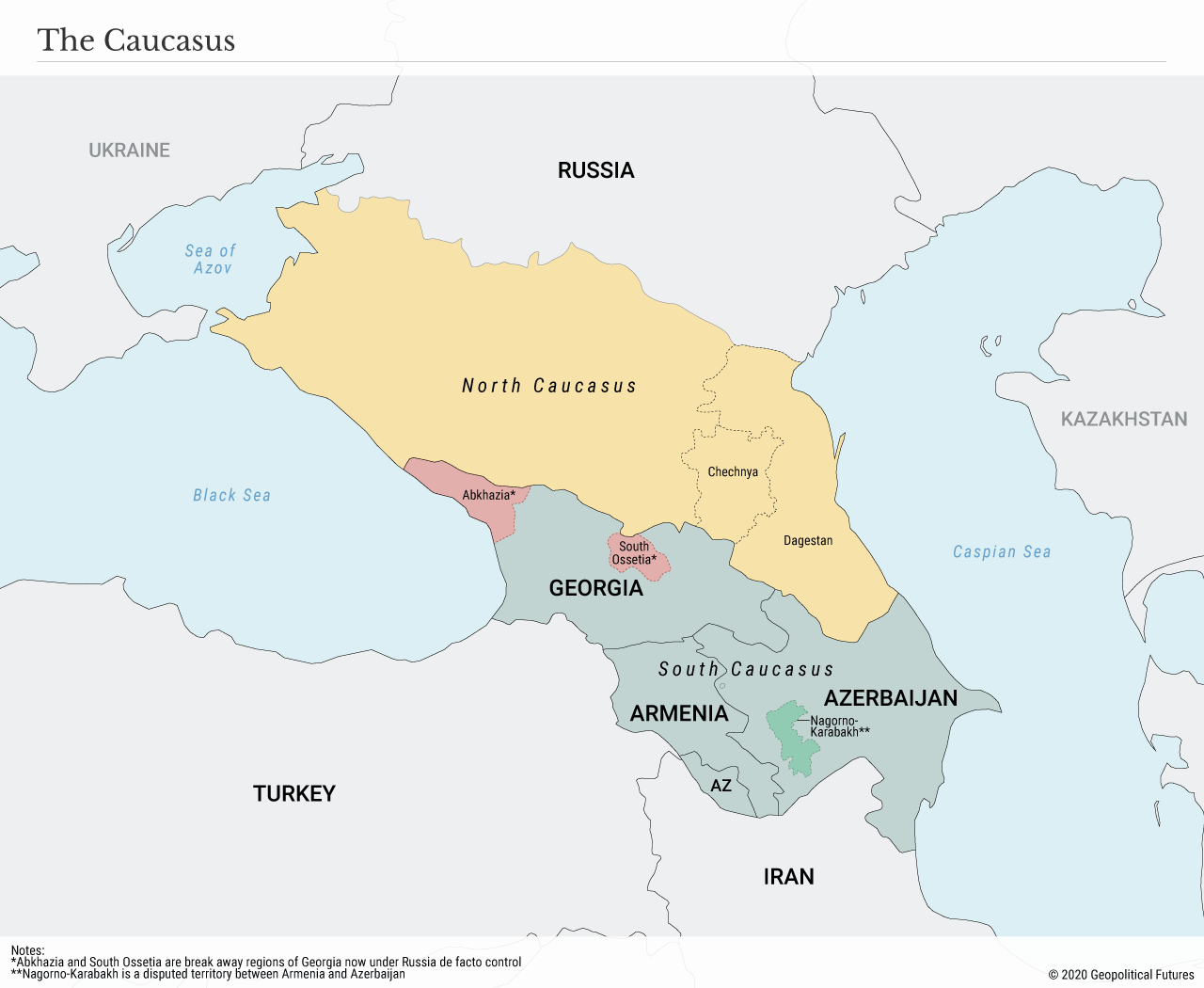Kamran Bokhari
 Russia’s weakening, especially following its invasion of Ukraine, has serious implications for its southern flank. In the years ahead, Moscow’s ability to project power in the Black Sea basin will decline, and one of the main beneficiaries will be Turkey. Though currently overwhelmed by political and economic problems at home, in the medium to long term Turkey can be expected to fill the strategic vacuum left by Russia’s receding footprint in the Caucasus region.
Russia’s weakening, especially following its invasion of Ukraine, has serious implications for its southern flank. In the years ahead, Moscow’s ability to project power in the Black Sea basin will decline, and one of the main beneficiaries will be Turkey. Though currently overwhelmed by political and economic problems at home, in the medium to long term Turkey can be expected to fill the strategic vacuum left by Russia’s receding footprint in the Caucasus region.The countries of the region are even starting to publicly acknowledge Russia’s decline. In a Sept. 4 interview with Italian paper La Repubblica, Armenian Prime Minister Nikol Pashinyan said Russia had failed to ensure his country’s security from an increasingly aggressive Azerbaijan, which since late 2020 has gained the upper hand in the disputed Nagorno-Karabakh region. Responding to the claims, Kremlin spokesman Dmitry Peskov told reporters that his country continues to be the “guarantor of security” in the region. Peskov also insisted that Moscow has played a consistent role in stabilizing the region and will continue to do so. Separately, Russian Foreign Ministry spokesperson Maria Zakharova called Pashinyan’s comments “public rhetoric verging on rudeness” and said that, rather than blaming others, the Armenians should take responsibility for their own actions. A day earlier, the Russian Defense Ministry announced that it had replaced the head of its peacekeeping forces in the South Caucasus, the second change in recent months.
The Armenian prime minister’s comments were extraordinary, especially considering that Yerevan has long been a close ally of Moscow and dependent on the Kremlin for its security and economic well-being. Russia’s reaction was equally telling, reflective of just how weak its position has become – at least in the conflict between Armenia and Azerbaijan, both former Soviet republics that have maintained ties with Russia. Pashinyan explained Moscow’s inability to provide for Armenia’s security as a result of the Kremlin’s preoccupation with the Ukraine war. But the fact is that the situation in the South Caucasus predates the conflict in Ukraine.
In the summer of 2020, fighting between Azerbaijan and Armenia over Nagorno-Karabakh erupted once again. Azerbaijan retook territories that Armenia had controlled since the end of the First Nagorno-Karabakh War, which ended in 1994. The Azerbaijanis were able to force a major reversal in the regional balance of power in large part due to military and intelligence support from their ally Turkey. The Turks took advantage of an opening in what was unquestionably part of Russia’s sphere of influence.
For decades following the Soviet Union’s collapse, Moscow had been the security guarantor of the region – which explains why the Nagorno-Karabakh conflict was left frozen in Armenia’s favor for a quarter of a century. Turkey and Azerbaijan saw an opportunity in Russia’s focus on its western neighbor since the ouster in February 2014 of the pro-Russian government in Kyiv. Ankara and Baku realized that Moscow was distracted and unlikely to intervene in Nagorno-Karabakh – despite the fact that it had, and still has, troops stationed in the area. Their bet paid off. When the fighting in 2020 escalated, the most that the Russians could do was formally preside over the cessation of hostilities later that year.
Russia’s peacekeeping operation, which began following the conflict in 2020, was ineffective because Moscow was likely already preparing for the war in Ukraine, which it believed would strengthen its position relative to the West or at least prevent its further decline. Nineteen months into the Ukraine campaign, the Russians find themselves in a far weaker position given the terrible performance of Russian forces on the ground, the economic toll of Western sanctions and, more recently, the infighting within the Kremlin exemplified by the Wagner crisis.
Though Pashinyan only recently expressed it in public, he’s been watching the Russians flounder for some time now. His comments show that he realizes his country can no longer rely on Russia and that he needs a new strategy. He also understands that, despite the U.S.’ official recognition in April 2021 of the 1915 Armenian genocide at the hands of the Ottoman Empire, Washington has done very little to challenge the Turkish-Azerbaijani alignment in the South Caucasus. Indeed, it’s becoming increasingly clear that U.S. and Turkish interests are converging, particularly given the situation in Ukraine. This is why, despite facing opposition at home, Pashinyan has been trying to work with the Turks to insulate his country from an increasingly assertive Azerbaijan.
The Armenians aren’t the only ones in Russia’s near abroad to realize the tectonic shifts underway. The Georgians are also closely watching the situation. They have a lot at stake with the presence of Russian forces in two breakaway regions, Abkhazia and South Ossetia. Any further weakening of Moscow could allow them to regain control over these two territories. With signs of growing closeness between Ankara and Tbilisi, Georgia certainly wouldn’t decline Turkey’s help if it was offered.
For now, the Turks are focused on leveraging the Ukraine conflict to enhance their influence in the northern Black Sea basin, which the Russians seized from the Ottoman Empire in the late 18th century. Since 2014, the Turks have opposed Russia’s annexation of Crimea, whose Tatar population they view as their ethnic kin. More recently, Ankara’s role in brokering the now-defunct Black Sea grain deal between Russia and Ukraine and its efforts to revive it are a small but key part of Turkey’s strategy here. Ultimately, the Turks are seeking to re-establish leadership over their former sphere of influence at Russia’s expense.
No comments:
Post a Comment